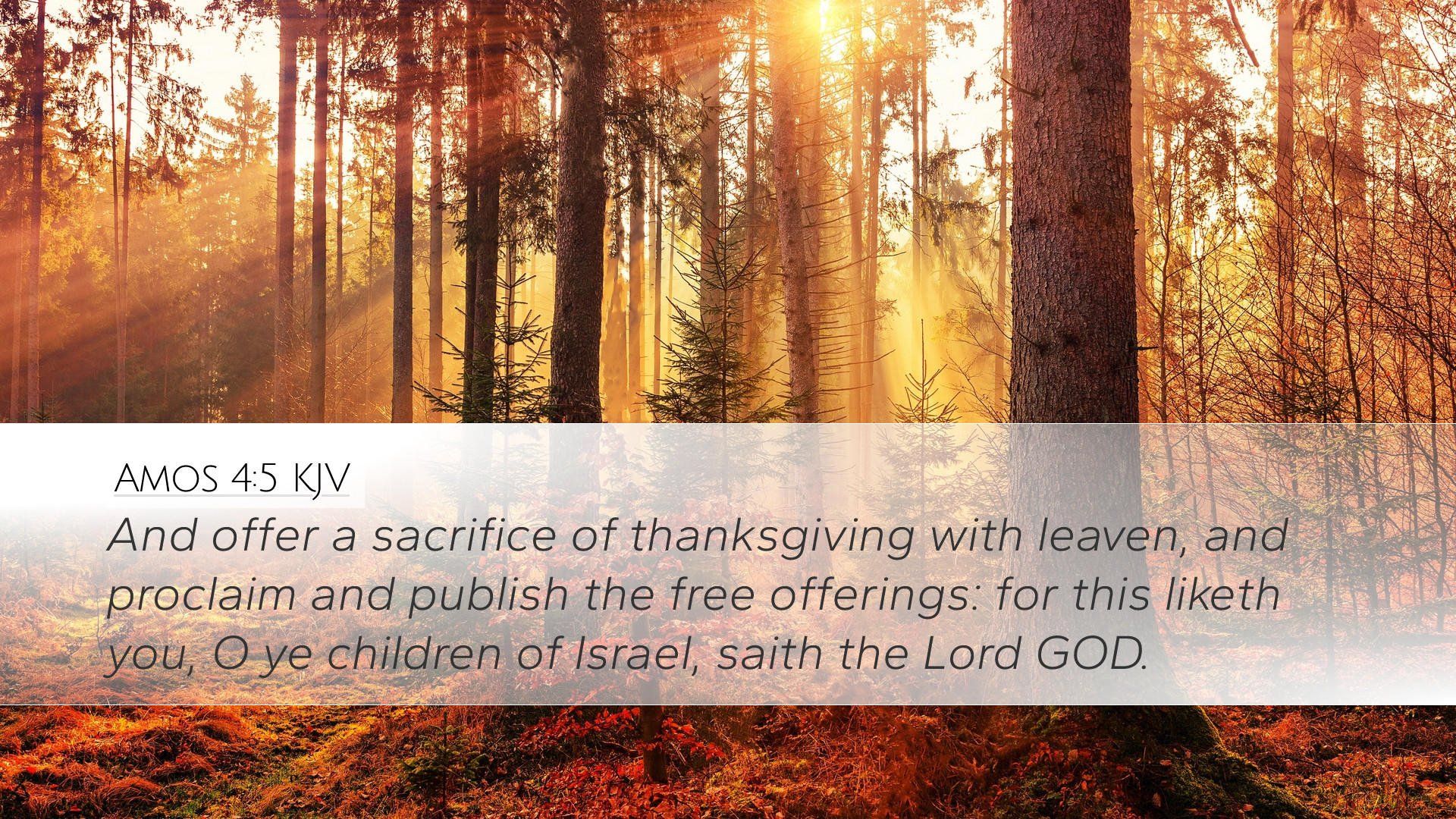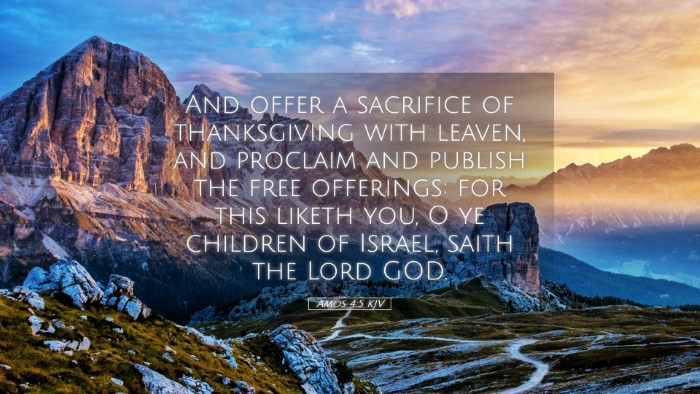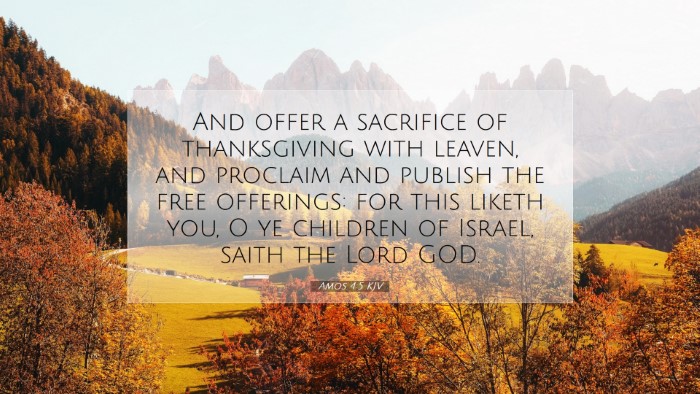Old Testament
Genesis Exodus Leviticus Numbers Deuteronomy Joshua Judges Ruth 1 Samuel 2 Samuel 1 Kings 2 Kings 1 Chronicles 2 Chronicles Ezra Nehemiah Esther Job Psalms Proverbs Ecclesiastes Song of Solomon Isaiah Jeremiah Lamentations Ezekiel Daniel Hosea Joel Amos Obadiah Jonah Micah Nahum Habakkuk Zephaniah Haggai Zechariah MalachiAmos 4:5
Amos 4:5 KJV
And offer a sacrifice of thanksgiving with leaven, and proclaim and publish the free offerings: for this liketh you, O ye children of Israel, saith the Lord GOD.
Amos 4:5 Bible Commentary
Amos 4:5 - Bible Commentary Summary
Verse Context: Amos 4:5 states, "And offer a sacrifice of thanksgiving with leaven, and proclaim and publish the free offerings: for this liketh you, O ye children of Israel, saith the Lord God."
Introduction
The Book of Amos presents a profound prophetic message to the northern kingdom of Israel, emphasizing themes of justice, righteousness, and divine judgment. Amos 4:5 confronts the Israelites regarding their sacrificial practices, challenging them to reflect on the true nature of worship and the authenticity of their offerings.
Commentary Insights
-
Matthew Henry's Perspective
Matthew Henry emphasizes the irony in the call for sacrifices that involve leaven, a substance often associated with sin and corruption in Scripture. He argues that the Israelites, while engaging in religious practices, were failing to understand the significance of holiness in their worship. Henry remarks that their offerings were dictated by their own desires rather than by true devotion to God. This verse serves as a reminder that external rites mean little without internal sincerity.
-
Albert Barnes' Commentary
Albert Barnes highlights the historical significance of leaven in the sacrificial system as a symbol of impurity. He points out that the command to "offer a sacrifice of thanksgiving with leaven" appears paradoxical, as leaven is typically excluded from the offerings made to God. Barnes interprets this as God's indictment of Israel's superficial worship—indicating that they were offering sacrifices while their hearts remained far from Him. He urges readers to consider the nature of their offerings to God, ensuring they reflect genuine gratitude and repentance.
-
Adam Clarke's Insights
Adam Clarke delves into the cultural context of Israelite worship and the significance of public proclamations of sacrifices. He notes that the Israelites were proud of their freewill offerings and desired to display their piety. Clarke critiques their motivations, suggesting that their desire for public acknowledgment overshadowed their commitment to God's laws. He concludes that the Lord's disdain for their practices stems not from the sacrifices themselves, but from the lack of true reverence and acknowledgment of His sovereignty.
Theological Implications
The issues presented in Amos 4:5 resonate deeply with modern congregational life. Theological reflection reveals the necessity for believers to engage in worship that is both external and internal, ensuring that their actions align with the motivations of their hearts. The text calls for introspection regarding the nature of worship—encouraging an understanding that true sacrifice is rooted in thanksgiving and genuine relationship with God.
Practical Applications for Today
-
Authenticity in Worship:
Pastors and church leaders should encourage congregations to pursue authenticity in worship. This involves fostering an environment where members are invited to express their faith genuinely, reflecting true gratitude rather than mere obligation.
-
Understanding Sacrificial Living:
Students of the Bible should explore the broader implications of sacrificial living, considering ways they can offer their lives as living sacrifices (Romans 12:1) that are pleasing to God, marked by righteousness and love.
-
Guarding Against Ritualism:
The commentary on this verse serves as a caution against ritualism—performing religious duties without heartfelt investment. Theological educators should aim to teach that relationship with God should be the foundation for worship practices.
-
Engaging with God’s Justice:
Given Amos’s focus on social justice, theologians should emphasize the importance of aligning worship with justice, mercy, and humility in the expressions of faith communities.
Conclusion
Amos 4:5 transcends its historical context, calling contemporary believers to reconsider the nature of their worship. Utilizing the rich insights from esteemed commentators such as Matthew Henry, Albert Barnes, and Adam Clarke, we gain a comprehensive perspective on the significance of this verse. The collective message urges a return to worship that reflects true devotion, sincerity, and social responsibility, helping believers foster a vibrant and authentic relationship with God.


